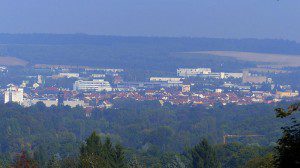
(Click to enlarge.)
A couple of nights ago, we had dinner in the town of Weimar, only about 12.4 miles from Erfurt, as the crow flies.
Weimar is tiny — it has only about 65,000 inhabitants — but its cultural importance is enormous.
Martin Luther was in Weimar on several occasions.
Between 1608 and 1617, Johann Sebastian Bach worked as a court organist in Weimar.
In the nineteenth century, Franz Liszt made the city a center of German music. He premiered Richard Wagner’s Lohengrin in Weimar.
Richard Strauss served between 1889 and 1894 as assistant director of the court orchestra in Weimar.
Artists like Wassily Kandinsky, Lyonel Feininger, and Paul Klee lived and painted in Weimar.
Walter Gropius founded the Bauhaus design movement in Weimar.
Friedrich Nietzsche died in Weimar.
The prominent ‘German writers Johann Gottfried von Herder and Christoph Martin Wieland lived in Weimar.
Most of all, though, Weimar is associated with the titanic figures of Friedrich Schiller and Johann Wolfgang von Goethe, who lived in the city and are buried in it.
And then, roughly five miles away, the Nazis built the Buchenwald concentration camp, where, although it was intended more as a slave-labor facility than as a place of systematic extermination, an estimated 56,545 inmates were murdered.
We visited Buchenwald this evening.
Among the prisoners at Buchenwald, at one time or another, were such notable people as the child psychologist Bruno Bettelheim; Imre Kertész, future 2002 Nobel laureate in literature; the once and future French prime minister Léon Blum; the Protestant theologian and eventual martyr Dietrich Bonhoeffer; a former Dutch prime minister; a former Belgian prime minister; Elie Wiesel, future winner of the 1996 Nobel Peace Prize; Édouard Daladier, former leader of France; and even Robert Clary, the French actor who would eventually play Corporal Louis LeBeau in the television series Hogan’s Heroes.
Both the glory and the horror of German history are on full display in and immediately around Weimar.
Posted from Erfurt, Germany











